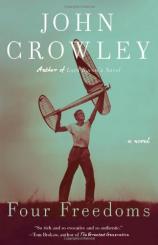Reading Group Guide
Discussion Questions
Four Freedoms

1. "War and the sex urge go together," says Pancho Notzing. The author pictures a nation at war, people uprooted and in motion, as increasing the opportunity and the possibility for sex. Does this seem convincing? If it was so, why don't we hear about it later?
2. One of the women in the Van Damme plant says "We're doing too well out of this war. It's not right." Men --- and women even more so --- suddenly began earning far more money in war industries than they had made during the Depression. What accounts for her feeling that she's getting something she shouldn't?
3. What is it about Prosper that accounts for his success with women? Some of the women don't regard him as a man --- Diane, thinking of going to the club with him, thinks "it wasn't like you were stepping out with an actual fellow anyway." Does a relation with Prosper seem to have no consequences?
4. Late in the book, Connie Wrobleski wonders why the same system that made everything we needed for war can't provide everyone with jobs producing what people want, not only houses and refrigerators and free health care but fashion and fun. Could that happen, or is it "utopian" in the sense of an unrealizable dream? Connie seems to guess what's needed for it to work [p. 292], but says it's impossible. Is it still impossible today?
5. Prosper finds it delightful to be in a workplace with no stairs. If you're disabled, perhaps you can't get into a building to get a job; but if there's a ramp and you can get in and get a job or go to school, are you still disabled? Discuss the difference between Prosper's world and ours today.
6. One of the women in the plant surprises herself by saying, "Good night, see you tomorrow" to a "colored" woman who works beside her: she's never said "good night" to a woman of color in her life. Did the tremendous mixing of people of many kinds change Americans' feelings about race and class? What might have been the consequences in the postwar world?
7. Vi tries to decide whether Prosper has a cold heart because of growing up with a disability. What does she mean by this? That he couldn't allow himself to hope or love too much? That the hardness of life for him in that period would harden his heart as well? Is either of these true of Prosper? Do you think he was exceptional at this time?
8. Connie Wrobleski believes that she's learned something about men by working at the plant as an inspector: they aren't always as competent and good at their jobs as they want women to believe, and they don't want women to know it. Do you think this is something many women might have felt when they entered the workforce?
9. The doctors who treat Prosper never describe in detail the problems he'll face. Diane doesn't want Danny to know her family is Hispanic. Vi guesses what the relation between May and Bea is, but they themselves never say it. Why did people in that time think it was best not to say things such as these? What effect did it have?
10. In a novel about the past, it's important that the author is able to capture not only what happened and what the conditions of life were like, but how people thought, the assumptions they made about right and wrong, good and bad, possibilities and dangers. Does the author do a good job in this respect, or was it unconvincing? Does the language of the book help to make you feel you are experiencing the past? Find some examples.
11. Did it seem surprising that a charity case like Prosper was allowed to spend more than a year in a hospital being cared for? Prosper is not only lucky to have been picked out by a charitable group, he's lucky in having relatives who can provide for him. His Aunt May gets a couple of glimpses of what might have become of him otherwise. Discuss.
12. At the end of the book, the four people (and a little dog) heading off for San Francisco to see the United Nations formed might remind us of four characters in a famous American story. Which one? How do the characters match up? Are there other characters and places and themes in the book that seem to relate to that same famous story? Why does the author use this analogy?
Four Freedoms
- Publication Date: May 18, 2010
- Paperback: 400 pages
- Publisher: Harper Perennial
- ISBN-10: 0061231517
- ISBN-13: 9780061231513








